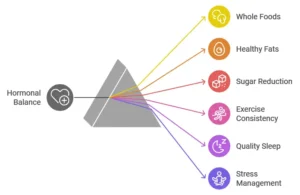How Do I Balance My Hormones to Lose Weight

Are you struggling to shed those extra pounds despite your best efforts? The answer might lie in your hormones. Hormonal imbalances can significantly impact your weight, affecting how your body stores fat and regulates appetite.
If you’re wondering, “How do I balance my hormones to lose weight?” you’re in the right place. This article explores practical strategies and scientific insights to help you manage your hormones effectively and promote weight loss.
How Hormones Affect Your Weight?
Hormones are powerful chemical messengers produced by glands in the endocrine system. These messengers travel through the bloodstream to tissues and organs, regulating various bodily functions including growth, metabolism, mood, and reproductive processes. The intricate balance of hormones is essential for maintaining overall health and well-being.
Key Hormones Involved in Weight Regulation
Insulin:
The pancreas produces insulin and plays an important role in regulating blood sugar levels. Your body converts carbohydrates from food into glucose and then releases them into the bloodstream. Insulin helps cells absorb glucose for energy or storage for later use.
High insulin levels, often caused by a diet high in refined sugars and carbohydrates, can lead to increased fat storage and difficulty losing weight. Studies have shown that managing insulin levels through diet and exercise can aid in weight loss and improve metabolic health.
Leptin and Ghrelin:
Produced by fat cells, leptin signals the brain to stop eating when you’re full common name for it is the “satiety hormone.”
Ghrelin also called the “hunger hormone,” is a hormone produced in the stomach, that increases appetite. Imbalances in these hormones can lead to overeating and weight gain. For instance, high ghrelin levels can increase hunger, while leptin resistance (where the brain doesn’t respond to leptin signals) can prevent you from feeling full.
Research indicates that sleep deprivation and high stress levels can disrupt the balance of leptin and ghrelin, making weight management more challenging.
Cortisol:
Cortisol is a stress hormone produced by the adrenal glands. It helps the body respond to stress and has various functions, including regulating metabolism and immune response.
Chronic stress can lead to elevated cortisol levels, linked to increased appetite and abdominal fat storage. This is because cortisol can promote fat storage in visceral areas, particularly around the abdomen which is connected to greater health risks.
Thyroid Hormones (Thyroxine – T4 and Triiodothyronine – T3):
The thyroid gland produces T4 and T3, which regulate metabolism, energy levels, and overall metabolic rate.
Hypothyroidism, a condition in which the thyroid doesn’t produce enough hormones, can slow metabolism, leading to weight gain and difficulty losing weight. Conversely, hyperthyroidism, where the thyroid produces too much hormone, can cause weight loss. Thyroid function tests are crucial for diagnosing and managing these conditions.
Estrogen and Progesterone:
These female sex hormones regulate reproductive processes and significantly affect the metabolism and fat distribution.
Estrogen levels decline during menopause, which can lead to increased abdominal fat. Progesterone balances estrogen and imbalances can cause weight gain and water retention. Studies suggest that hormone replacement therapy (HRT) can help manage weight and reduce abdominal fat in postmenopausal women.
Testosterone:
Although predominantly known as a male hormone, testosterone is also important for women. It contributes to muscle mass, bone density, and fat distribution. Women with low testosterone may experience increased body fat and decreased muscle mass.
Maintaining optimal testosterone levels is important for overall body composition and metabolic health. Research supports the role of resistance training in boosting testosterone levels naturally.
Understanding these key hormones and their roles in weight regulation can empower you to make informed decisions about your diet, exercise, and lifestyle to achieve better hormonal balance and support weight loss.
How Do I Balance My Hormones to Lose Weight?

Maintaining hormonal balance is essential for overall health and well-being, especially when managing weight. Several lifestyle factors play a significant role in influencing hormonal balance. Let’s delve into each of these factors in detail:
Diet
- Whole Foods: Emphasize a diet rich in whole, unprocessed foods such as vegetables, fruits, lean proteins, and whole grains. These foods provide essential nutrients and fiber that support hormonal health and weight management.
- Healthy Fats: Increase your intake of foods high in unsaturated fats, such as olive oil, nuts, seeds, and avocados. Healthy fats are crucial for hormone production and absorption of fat-soluble vitamins.
- Reduce Sugar and Processed Foods: Limit sugary beverages, sweets, and processed foods. Excess sugar and refined carbohydrates can cause spikes in insulin levels, leading to weight gain and insulin resistance.
Also, explore Healthy Sweet Snacks for Weight Loss.
Exercise
- Cardio and Strength Training: Incorporate cardiovascular and strength training activities into your fitness regimen. Strength training increases muscle mass and speeds up metabolism, while Cardio exercise helps burn calories and enhance cardiovascular health.
- Consistency: Aim for regular physical activity to maintain hormonal balance. Consistency is key to reaping the benefits of exercise on hormone regulation and weight management.
Sleep
- Prioritize quality sleep and aim for 7-9 hours of uninterrupted sleep per night.
- Poor sleep quality and inadequate sleep duration can disrupt hormone levels, particularly cortisol and ghrelin, leading to increased appetite and weight gain.
Stress Management
- Practice stress-reducing techniques such as meditation, yoga, and deep breathing exercises.
- These activities can lower cortisol levels, reduce stress, and support weight management efforts.
Environmental Factors
- Minimize exposure to endocrine-disrupting chemicals, found in plastics, pesticides, and personal care products.
- Chemicals like BPA and phthalates can interfere with hormone production and disrupt hormonal balance.
Menstrual Cycle
- Hormone levels fluctuate throughout the menstrual cycle, influencing metabolism and appetite.
- Understanding your menstrual cycle can help you tailor your diet and exercise routine to optimize hormonal balance and support weight management goals.
Paying attention to these lifestyle factors and making positive changes can support hormonal balance and enhance your efforts to achieve and maintain a healthy weight.
Hormonal Balance Across Different Age Groups
In Your 20s
- Women in their 20s may experience menstrual irregularities, polycystic ovary syndrome (PCOS), and stress-related hormonal imbalances.
- Focus on maintaining a balanced diet rich in nutrient-dense foods, regular exercise, and stress management techniques.
- Research suggests that adopting healthy lifestyle habits early on can positively impact long-term hormonal health.
In Your 30s
- Fertility concerns, postpartum hormonal changes, and early signs of perimenopause may arise in your 30s.
- Prioritize nutrient-rich foods to support reproductive health, maintain a healthy weight through regular exercise and strength training, and implement stress management strategies.
- Studies have shown that maintaining a healthy lifestyle can help mitigate the hormonal changes associated with aging.
In Your 40s
- Women in their 40s may experience perimenopausal symptoms, changes in metabolism, and increased stress levels.
-
Make dietary changes for high phytoestrogens, prioritize stress-reduction strategies, and exercise your heart and limbs to promote bone health and metabolism.
- Research indicates that lifestyle modifications can help alleviate perimenopausal symptoms and support overall well-being.
In Your 50s and Beyond
- Menopause brings about hormonal fluctuations, weight gain, hot flashes, and mood changes.
- Focus on a diet rich in calcium and vitamin D to support bone health, engage in regular physical activity to maintain muscle mass and cardiovascular health, and consider hormone replacement therapy (HRT) under medical supervision if needed.
- Studies have shown that HRT can effectively manage menopausal symptoms and improve quality of life.
By implementing these practical tips and understanding the unique hormonal challenges at different stages of life, busy women can take proactive steps to optimize hormonal balance and support overall health and well-being.
Supplements for Hormonal Balance

When supporting hormonal balance, supplements can play a complementary role alongside lifestyle changes. Here are some popular supplements known for their potential benefits in hormone regulation:
Popular Supplements
Maca Root:
- It is believed to balance estrogen and progesterone levels.
- Limited studies suggest that maca root may help alleviate symptoms associated with hormonal imbalances in women, such as irregular menstrual cycles and menopausal symptoms.
Vitex (Chaste Tree Berry):
- Traditionally used for PMS and menstrual cycle regulation.
- Studies have shown that Vitex may help regulate menstrual cycles and relieve symptoms of PMS, possibly by affecting hormone levels in the body.
Evening Primrose Oil:
- It is known for its potential to alleviate PMS and menopausal symptoms.
- Evening primrose oil contains gamma-linolenic acid (GLA), which may help reduce symptoms of hormonal imbalances, although more research is needed to confirm its effectiveness.
Ashwagandha:
- Help lower cortisol levels and improve the body’s stress response.
- Studies suggest that ashwagandha supplementation may reduce cortisol levels and stress-related symptoms in individuals with chronic stress.
Omega-3 Fatty Acids:
- Support overall hormonal health and reduce inflammation.
- Omega-3 fatty acids, found in fatty fish like salmon and supplements like fish oil, have been shown to have anti-inflammatory properties and may help balance hormones by reducing inflammation in the body.
Probiotics:
- Improve gut health, which is linked to hormone regulation.
- The gut microbiota plays a role in hormone metabolism and signaling. Probiotics may help support gut health and improve hormone balance.
Vitamin D:
- It is important for thyroid function and overall hormonal balance.
- Vitamin D deficiency has been associated with hormonal imbalances and may contribute to conditions such as hypothyroidism. Supplementation with vitamin D may help support thyroid function and overall hormonal health.
Magnesium:
- It helps with stress reduction and supports hormonal functions.
- Magnesium regulates hormones and helps reduce stress and anxiety. Studies suggest that magnesium supplementation may improve hormonal balance and mood.
Safety Considerations
- Before starting any supplement regimen, it’s important to consult with a healthcare professional, especially if you have underlying health conditions or are taking other medications.
- Be aware of possible interactions and side effects associated with supplements. Monitor your body’s response and discontinue use if you experience adverse effects.
- Choose high-quality supplements from reputable sources to ensure purity and potency. Follow recommended dosage guidelines provided by healthcare professionals or the supplement manufacturer.
Natural Alternatives
- Incorporate whole nutrient-rich foods into your diet for hormonal balance. Include plenty of fruits, vegetables, lean proteins, and healthy fats.
- Engage in cardiovascular exercise and strength training to promote overall health and hormone regulation.
- Practice stress-reducing techniques such as mindfulness meditation, deep breathing exercises, or yoga to lower cortisol levels and support hormonal balance.
- Prioritize quality sleep and stay hydrated to support overall health and hormone regulation.
By incorporating these supplements and natural alternatives into your routine, along with lifestyle modifications, you can support hormonal balance and optimize your overall well-being.
Practical Tips for Busy Women
Quick and Healthy Eating Tips
-
Dedicate time each week to preparing meals in advance when you’re tight on time. This can help you avoid harmful eating options.
-
Keep nutritious snacks like nuts, yogurt, and fruits on hand for when hunger strikes on the go.
- When dining in or getting takeaway, choose healthier options such as grilled veggies, whole grains, and salads with lean proteins.
Also, explore the Best Low-carb Snacks for Weight Loss.
Efficient Exercise Routines
- Incorporate high-intensity interval training (HIIT) into your exercise routine. HIIT workouts can be as short as 15-20 minutes but are highly effective for burning calories and improving fitness.
- Find opportunities to stay active throughout the day, even when busy.
- Take the stairs instead of the elevator, walk during breaks, or do desk exercises to keep your body moving.
Also, read Best Cardio to Burn Belly Fat at Home.
Optimizing Sleep
- To create a regular sleep schedule, stick to a regular bedtime and wake-up time every day, even on the weekends,
- Consistency helps regulate your body’s internal clock and improves sleep quality.
- Create a conducive sleep environment by making your bedroom dark, quiet, and cool.
- Use blackout curtains, white noise machines, or earplugs to block out distractions and promote restful sleep.
Stress Management for Busy Lives
- Incorporate short mindfulness exercises into your daily routine to reduce stress and promote relaxation.
- Practice deep breathing, mindfulness meditation, or progressive muscle relaxation for a few minutes daily.
- Engage in activities that help you unwind and de-stress, such as stretching, yoga, or calming music. These techniques can lower cortisol levels and improve overall well-being.
Conclusion
Achieving hormonal balance is essential for overall health and weight management. Combining a healthy diet, exercise, stress management, sleep, and supplements helps women optimize their hormonal health. Consulting a healthcare professional before starting supplements and prioritizing quality and safety is crucial.
Empowering women with knowledge and practical strategies enables them to take control of their hormonal health and achieve their wellness goals.
FAQs
1. Are supplements necessary for balancing hormones?
Supplements can balance hormones, especially when combined with a healthy lifestyle. However, they should not replace a balanced diet and regular exercise. It’s essential to consult with a healthcare professional before starting any new supplement regimen.
2. Can lifestyle changes alone help balance hormones?
Yes, lifestyle changes such as adopting a healthy diet, engaging in regular physical activity, managing stress, getting adequate sleep, and staying hydrated can all contribute to hormonal balance. These natural approaches should be the foundation of any hormonal health regimen.
3. How long does it take to see results from lifestyle changes and supplements?
The timeframe for seeing results from lifestyle changes and supplements can vary depending on individual factors such as overall health, hormone levels, and adherence to the regimen. Consistency is key, and it may take several weeks to months to notice significant improvements in hormonal balance and overall well-being.
4. Are there any side effects associated with hormone-balancing supplements?
While many supplements are generally considered safe when taken as directed, some individuals may experience side effects or interactions with other medications. It’s essential to consult with a healthcare professional before starting any new supplement regimen and to monitor adverse reactions.
5. Can hormonal imbalances be reversed naturally?
In many cases, hormonal imbalances can be improved or managed through natural approaches such as diet, exercise, stress management, and supplementation. However, severe hormonal imbalances may require medical intervention. Work with a healthcare professional to determine the best course of action for your individual needs.
6. How can I track my progress in balancing hormones?
Keeping a journal to track symptoms, changes in diet and lifestyle, and any supplements or medications can help you monitor your progress in balancing hormones. Regular check-ins with a healthcare professional can provide valuable insight and guidance on your journey to hormonal health.







